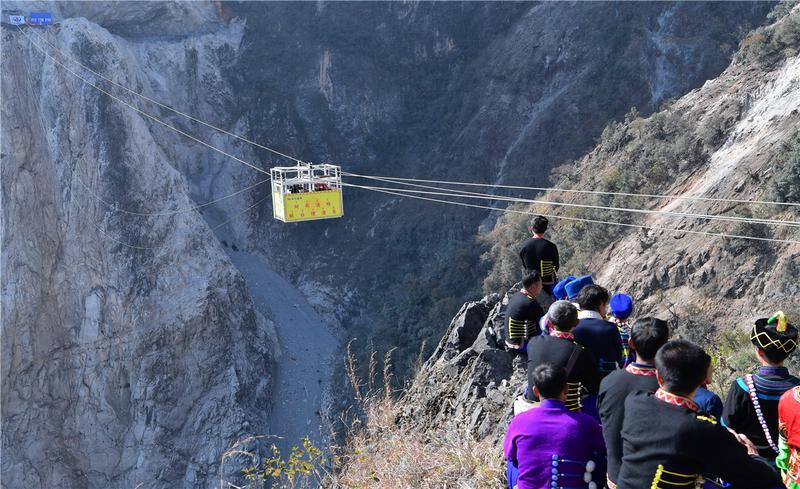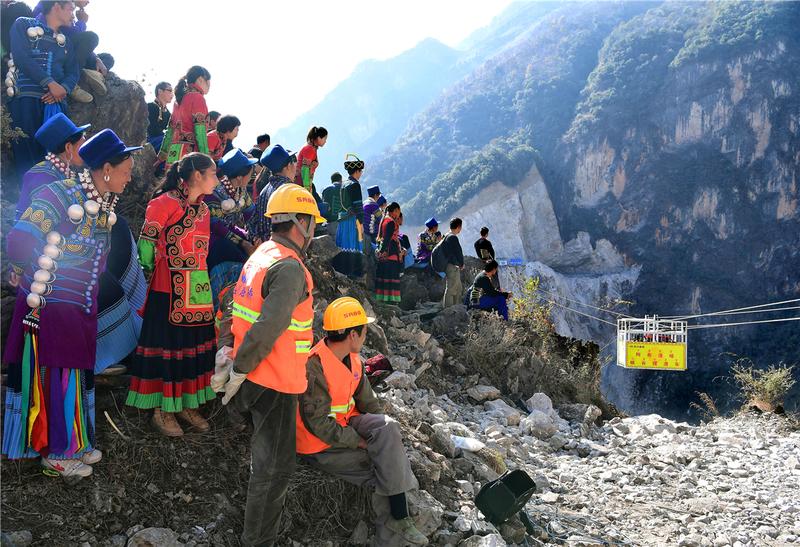



Qiesha Secong, a 30-year-old resident of Abuluoha village in Sichuan province, sold his family's only horse early last month.
The pony, which he bought four years ago, was valuable to the Yi man, whose home village is in Wuyi township, Butuo county in Sichuan's Liangshan Yi autonomous prefecture.

Villagers dressed in Yi ethnic clothes wait for a cable car to reach their far-flung village of Abuluoha in Butuo county, Sichuan province, on Tuesday, when the cableway was put into operation. [Photo/China Daily]
"My village had no access to any road and I had to trek with the pony along a mountain path to carry home seeds, fertilizer, salt and rice. The pony is not tall but can carry more than 200 kilograms," he said.
He parted with his precious horse because a 3.8-kilometer road is expected to open in April and he will be able to ride a much faster motorcycle.
Abuluoha, which means a valley surrounded by rolling mountains and a less-traveled place in the language of the Yi ethnic group, is located in the deep valley of the Jinsha River and is surrounded by mountains on three sides and cliffs on the other.
Before the construction of the road linking the village to the outside started in June 2018, Abuluoha was believed to be the last village without a road in the country, said Song Ming, an information officer with the Liangshan prefecture government.
Villagers used to spend more than three hours traveling from their homes in a valley to the road being built, where they could go to the county seat through another village.

Villagers dressed in Yi ethnic clothes wait for a cable car to reach their far-flung village of Abuluoha in Butuo county, Sichuan province, on Tuesday, when the cableway was put into operation. [Photo/China Daily]
Workers have installed a 420-meter steel cable linking the valley with the road. There, a cable car can transport a 1 metric ton load.
Liangshan, which boasts the country's largest number of Yi people, is one of the least developed areas in Sichuan.
To alleviate poverty in Abuluoha — which has 253 people and is 60 kilometers from the Butuo county seat — the Sichuan provincial Department of Transportation is building the road.
Due to the village's inaccessibility, an M26 helicopter was rented to transport eight large excavators and other equipment.
As the construction site was very narrow, excavators could not be used at the same time and the pace of construction was very slow.
Sometimes only five meters of the road were built on a single day, said Hu Wei, an official in charge of the construction site.
On Tuesday afternoon, Ahdame Youzha, a 23-year-old grocery store owner in Abuluoha, spent about 20 minutes reaching the road from the cable car station.
"It used to take nearly seven hours to reach the county seat from my home. Thanks to the cable car, it takes less than three hours," she said.
Jinie Ziri, the village Party chief, said villagers would expand the growing area of seedless pepper and konjac, two local specialties, and build an eco-tourism base to increase income in the wake of the opening of the road in April.
